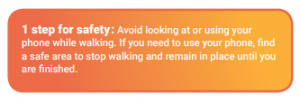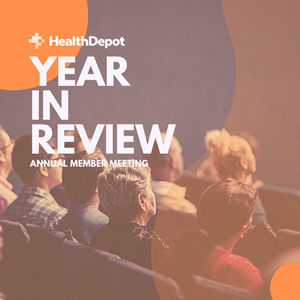
Health Depot Association Members,
We want to welcome our newest members, as well as our newly elected board member, Ike Bangs. Ike brings a wealth of expertise in the health industry, which will be invaluable as we continue our mission to identify health and wellness resources that offer meaningful value. We’re excited to provide solutions to members like you who are committed to exploring and finding the health options that work best for you and your family. At Health Depot, we’re here to support you every step of the way, offering exclusive access to a wide range of tools and resources designed just for our members.
We are pleased to announce a new partnership with ManhattanLife Insurance and Annuity Company. ManhattanLife is working with Health Depot to create new membership levels that provide access to limited health benefits. We recently announced two new Health Depot membership levels, HealthAscent and AccidentAscent, that provide access to Group Hospital Indemnity and Group Accident insurance through ManhattanLife. Both of these memberships have additional health & wellness related resources included like AirMed Emergency Air Transport, Massage Envy and Gym Discounts.
In our latest Member Poll, many of our Health Depot members identified two of our most valuable cost-saving tools—patient advocacy and telemedicine—as offering the greatest advantage. GetAdvocacy, formally known as Point Health, provides a navigator to help you find the lowest cost, closest provider for the service you need. And then after a visit to a provider, can help you understand your bill and make sure you got the best price available on bills of $1,500 or more. DialCare is a new telehealth service that is now offered to Health Depot members and provides unlimited consultations via phone or video with US Board Certified physicians.
We truly value your continued feedback on the benefits and resources that matter most to you. Please visit the Members’ Spot and your Member Portal for the most up-to-date information on your member benefits and resources. Stay connected and informed by using resources like Twitter, Facebook, LinkedIn, and our newsletter, as Health Depot works to identify new, valuable benefits and resources that are designed to work for you. Thank you once again for your ongoing support.
Sincerely,
Doug Abbott

If you missed the recent Annual Health Depot Member Meeting on COVID-19, here are the remarks President Doug Abbott made at that meeting:
Health Depot Association Members,
It is an unprecedented time in our nation as we collectively respond and react to the Coronavirus COVID-19 pandemic sweeping the world. At Health Depot, we are dedicated to the health and well-being of our members, employees and our surrounding communities.
As a reminder, we want our members to know many of our Health Depot membership levels include a telemedicine program. It is highly recommended that members first use telemedicine to avoid unnecessary contact. And our telemedicine benefits provide free and unlimited physician consultations for you and your family members. Many of our memberships also include a discount Rx benefit. You can find all the information about your membership in our Member Portal. We will also post COVID-19 updates on the Member Portal as new information arises.
Also, as the coronavirus spreads throughout the United States, we feel it necessary to inform you about the potential of longer hold times as questions about COVID-19 increase. Due to the likelihood of higher than normal call volume in our Member Services department, we ask that all members first reach out to Member Services by email for the quickest response at customerservice@premierhsllc.com.
In 2019, we were proud to be able to award scholarships of $2,500 to dependents of three Health Depot members, selected by Scholarship America, an independent administrator. Knowing the changes in the global economy that we are all faced with, Health Depot is pleased to extend this opportunity to apply for the 2020-21 scholastic year. Details will be provided to members in the coming weeks.
Please continue to regularly review our Health Depot information resources like Twitter, Facebook, LinkedIn and the newsletter, so you can stay informed as we continue to receive and communicate information that can be helpful to our members in the coming weeks and months. We want to say thank you for your patience and understanding as we navigate an uncertain time together. We wish everyone safety and good health during this time of precaution.
Sincerely,
Doug Abbott
At the recent Health Depot Annual Members Meeting, President Doug Abbott offered his thoughts on the state of the Health Depot and its progress. The following is an excerpt from the meeting:
2019 has started off strong for the state of the Health Depot Association with a membership of 23,000 across the country – members committed to researching and managing their health and wellness for themselves and their families. Although healthcare continues to shift and change at a national level, Health Depot remains committed to providing industry-leading benefits and value for its members.
To help our members better plan for the unexpected, we are pleased to announce new benefits and resources now available. Health Depot has partnered with AirMed International Air Transportation to provide Emergency Medical Air Transport on certain membership levels at no additional cost, to address medical emergencies that may happen while you are hours away from home. Also new in 2019, Guarantee Issued, Term Life Insurance benefits for the primary members are available on specific membership levels. This benefit is underwritten by Amalgamated Life Insurance Company and the primary member can choose coverage amounts of $15,000, $12,500, $10,000, or $5,000.
To our members with families, we are excited to offer a new scholarship opportunity for the 2019-2020 scholastic year to help with continuing education. We will award up to three scholarships of $2,500 to eligible applicants, selected by Scholarship America, an independent administrator. Members with eligible dependents will be receiving an email from Health Depot with more details shortly on qualifications for the scholarship and how to apply.
We appreciate your ongoing feedback regarding benefits and resources that you find valuable on your journey to managing your healthcare costs, as well as the support your Health Depot membership provides. With resources like Twitter, Facebook, Linked In and the newsletter, we want Health Depot members to stay informed as we continue to investigate new, competitive benefits and resources that work hard on your behalf. Thank you again for your continued support.
Sincerely,
Doug Abbott
Did you know that like your skin, your eyes are also sensitive to harmful UV rays. You might think UV is a concern only on bright, sunny days, but the facts might surprise you!
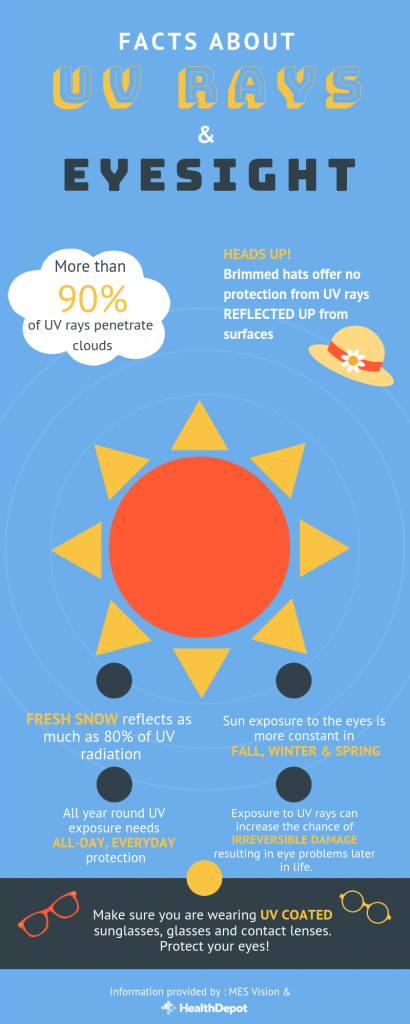

Don't give up on healthy eating during the holidays. Making a festive and elegant table for your holiday feast is a given, but consider using a variety of colorful vegetables and fruits to brighten up your spread as well. By adding sautéed red peppers, onions, and mushrooms to bowls of green vegetables, you can introduce a splash of color and additional nutrients to your guests.
Involve your young guests in helping to choose vegetables in a variety of colors at the store. By involving the children in these important decisions, they will feel a sense of pride and be more willing to try these new vegetables.
“Half of a meal should comprise fruits and vegetables that consist of a variety of colors,” said Vilma Andari, president and founder of NutraHealthFood and a spokeswoman for the American Heart Association. “The other two quarters should be whole grains and healthy proteins.”
Heart-healthy colorful veggies include sweet potatoes, Brussels sprouts, and acorn squash. Apples and nuts are also healthful and provide texture and variety to any holiday spread.
Enjoy creating a vibrant holiday feast for your loved ones this holiday season with a challenge to add as many colors as possible!
Be sure to visit the American Heart Association for ideas of how to add color and healthy eating recipes to your holiday table.
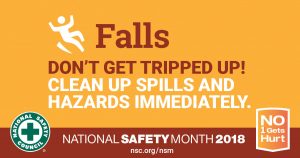
Slips and falls aren't typically thought of as a serious risk to our health, but they can be deadly. Falls are the third leading cause of unintentional injury-related deaths for all ages and the number one cause of death for those 65 and older, according to injuryfacts.nsc.org. The National Safety Council has provided some preventative that we can take to avoid falls and distracted walking.
How to Prevent Falls
Take these simple steps to prevent falls both at home and while out and about:
- Remove clutter, including electrical cords and other tripping hazards from walkways, stairs and doorways.
- Install nightlights in the bathroom, hallways and other areas to prevent tripping and falls at night.
- Always wear proper footwear and clean up spills immediately.
- Place non-slip adhesive strips on stairs and non-skid mats in the shower and bathroom.
- For older adults, install grab bars near showers and toilets and install rails on both sides of stairs. Older adults can also take balance classes, get their vision and hearing checked each year and talk with their doctors and pharmacist about fall risks from medication.
Distracted Walking - A Serious Risk
Today, nearly everyone has a cell phone and consequently distracted walking has become a serious risk. One study, published in the Journal of Safety Research, found that over a 10-year period, distracted walking was responsible for more than 10,000 serious injuries.
- Avoid cell phone use while walking, especially near crosswalks - talk with your friends and loved ones about this risk as well.
- Pay special attention in busy areas, such as airports and shopping centers, and even your own house - more than half of distracted walking incidents happen at home.
- Avoid other distracted walking risks, such as listening to headphones, when walking near intersections and other busy areas.
- When driving, look carefully for pedestrians distracted by their phones - slow down and pay special attention in school zones.
Source: National Safety Council
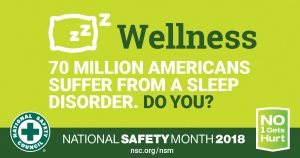
Taking care of daily issues, household needs and pressing work deadlines seem to always take priority over taking care of ourselves. Making a conscious effort to focus on our own wellness is critical to our overall wellbeing and health. As part of National Safety Month, the National Security Council has provided some tips on how to improve wellness at every stage of life.
Focus on Your Wellness Each Day
- Take the stairs instead of the elevator or go for a walk at lunch to add physical activity into your daily schedule
- Take advantage of workplace wellness programs and choose healthy snacks each day
- Find nearby options for exercise classes through your local parks department
- Take breaks throughout your day to refresh your body and mind - if you sit for long periods, stand up and stretch for a few minutes at a time
- Get regular medical checkups, such as an annual physical and age-appropriate tests - ask a professional about the right tests, exercise and nutrition choice for your physical fitness and age
- Talk to your doctor about alternatives to opioid pain medications - learn more at nsc.org/takeaction
Watch Out for Fatigue
Fatigue is more than just being tired. If you’re missing out on the recommended seven to nine hours of sleep each day, you could become sleep deprived and be at higher risk for the negative effects of fatigue.

- Chronic sleep deprivation causes depression, obesity, cardiovascular disease and other illnesses
- Fatigued driving is impaired driving – losing even two hours of sleep is similar to the effect of having three beers
- Night shifts and rotating shifts put you at a higher risk of fatigue – if possible, work with your employer to align your sleep and work schedules to get restful sleep
- To help combat fatigue, make your bedroom more conducive to sleep; a quiet, dark room that is not too hot and not too cold will help you relax and get to sleep sooner
- Avoid chemicals that affect sleep; caffeine, nicotine and alcohol can all contribute to sleep problems
- Help your loved ones get the proper amount of sleep – children and teens typically require even more sleep than adults
Additional Resources
Risks of Fatigue at the Workplace
Sample Employee Wellness Program
Source: National Safety Council
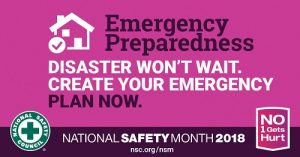
It is important to prepare for the unexpected because an emergency can happen at any time. With the National Safety Council and in honor of National Safety Month in June, we have compiled some of the best tips and resources for preparation.
Plan for Possible Emergencies
- Research, prepare for national disasters common to your area, such as floods, earthquakes or tornadoes. Stay informed during watches and warnings.
- Create an emergency kit for both your home and car
- Create a home emergency plan with your family and learn how to shut off your utilities
- Be a good participant in emergency drills at work and school by following instructions
- Store important phone numbers with other documents in a fire-proof safe or safety deposit box
- Learn first aid and CPR for children and adults and download the NSC First Aid app available on iTunes or Google App Store
Stock Your Emergency Kits Now
Your home emergency kit should contain:
- Food and water for each family member for three days, as well as a can opener and nonperishable foods
- Hand-crank or battery-powered flashlight and radio with extra batteries
- Full first aid kit, including hand sanitizer and garbage bags
- Plastic sheeting and duct tape for broken windows or leaks
- Whistle to signal for help
Your car emergency kit should contain:
- A properly inflated spare tire, wheel wrench, tripod jack and jumper cables
- A tool kit, compass, duct tape and car charger for your cell phone
- A flashlight with extra batteries, rain poncho and fire extinguisher
- Reflective triangles and vest, and brightly colored cloth to make your vehicle more visible
- A first aid kit and enough nonperishable food and water for three days
- Cold weather items such as a snow brush, shovel, windshield washer fluid, warm clothing, cat litter for traction and blankets
Be sure to take advantage of special free and discounted offers during National Safety Month, sponsored by National Safety Council.
- Free First Aid Online Course June 1-10. Register here.
- Discount on Emergency Preparedness Course June 1-9. Learn more here.
- Family Safety & Health magazine discount.
For more information on how you can be prepared in an emergency, be sure to review our previous blog on You are the Help Until Help Arrives.
Sources: National Safety Council, Office of Public Health Preparedness and Response
At the recent Health Depot Annual Members Meeting, President Doug Abbott shared his thoughts on the progress of the association. The following is an excerpt from the meeting:
As the first quarter of 2018 comes to a close, we are pleased with the growth and progress of the Health Depot Association over the past year. Our membership has grown to more than 20,000 strong across the country – members all committed to managing their health and wellness for themselves and their families. In 2017, we had some members hit hard with Hurricanes Harvey and Irma. With donations to the American Red Cross and working with partners like Teladoc, we will continue to help support those affected by the recent hurricane and natural disasters as our members work to get their families safe and businesses growing again. Our focus will continue to be on our members and providing the highest level of satisfaction with their membership and the benefits that Health Depot provides.
To provide more options and flexibility for our members, Health Depot created new membership levels and benefits for vision, dental and fixed-indemnity in 2017. We have also partnered with Pin Paws to create an affinity partner savings program for pet locating services. Additionally, through our newsletters, blog articles and social media community, our goal is to provide Health Depot members with timely and relevant content and resources to help as you research information and make decisions about health and wellness.
The remainder of 2018 promises to be an exciting year for associations like Health Depot. With a new executive order signed by President Trump in October 2017, the country is providing a new focus on Association Health Plans and Short Term Limited Duration plans, which we hope will make new opportunities and benefits available to you through Health Depot. We are receiving regular updates regarding this news as it develops and will share information with you as we learn more.
We are committed to researching industry-leading benefits and resources on your behalf so that you and your families have access to the health and wellness tools you need and look forward to continuing to serve you in 2018.
Sincerely,
Doug Abbott
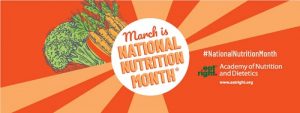
March is National Nutrition Month, an education and information campaign created by the Academy of Nutrition and Dietetics. It has been proven that a combination of making good food choices and creating exercise habits can help provide a healthier life for you and your family.
This year, the theme is to "Go Further with Food" and promotes the idea of starting with a healthy breakfast or fueling up with nutritious snacks before athletic activities as a great way to make your food work for your body and go further.
Some key tips:
- Include a variety of healthful foods from all of the food groups on a regular basis.
- Consider the foods you have on hand before buying more at the store.
- Buy only the amount that can be eaten or frozen within a few days and plan ways to use the leftovers later in the week.
- Be mindful of portion sizes. Eat and drink the amount that's right for you, as MyPlate encourages us to do.
- Continue to use good food safety practices.
- Find activities you enjoy and be physically active most days of the week.
- Realize the benefits of healthy eating by consulting with a registered dietitian nutritionist. RDNs can provide sound, easy-to-follow personalized nutrition advice to meet your lifestyle, preferences and health-related needs.
Tools to use:
- MyPlate - resource for building healthy portions and food choices
- EatRight.org - education resource for food, health and fitness
Source: http://sm.eatright.org/NNMinfo

